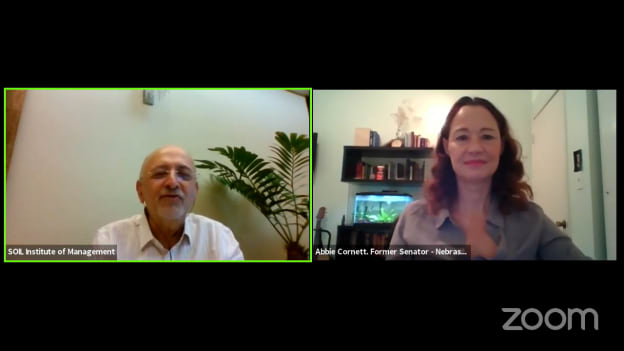They can take away everything from you but not your education: Abbie Cornett, Former Senator, Nebraska

Great leaders are not born from their mother’s womb. It’s the commoners who are nurtured to unleash their potential to become the phenomenal personalities. One such great personality has been Abbie Cornett, the former Senator, Nebraska, USA.
In conversation with Anil Sachdev, Founder and Chairman, SOIL Institute of Management, as part of the webinar series “Becoming the Best Version of Yourself”, Abbie talks about her life experiences, her motivation behind becoming a police officer, her key learnings, and some tips for the youth to keep the political polarization at a bay.
Putting aside one’s biases in a noisy world
When asked about how she manages to put her personal beliefs or biases away, Abbie quoted- “Respect. You might have your beliefs and I might have my own set of beliefs. But it’s about people being able to come together.”
She went on to explain how we tend to get entrenched in our own ideas. However, it is nevertheless important to be ready to listen to the others. We must remind ourselves that even if we don’t agree with what somebody says, we must respect them as a person. The dialogue must then be carried forward based on respect.
Even if one feels carried away by anger, one must be mindful of the damage that words can inflict, for emotional injuries last much longer than the physical ones.
Becoming a Police Officer and drawing on the learnings for life
Sharing what encouraged her to join the police force, Abbie said, “I joined the police department because I’m an adrenaline junkie. I love action and being in the middle of things. I was also into physical fitness at the time and in pretty good physical shape.”
She grew up with support from women across four generations of her family, all of whom were politically active. Her mother always emphasized, “People can take everything away from you but not your education. Hence, one must always keep learning.”
The job at the police department came with many important learnings. Receiving a call always meant that something had gone wrong somewhere. Hence, Abbie shared that they didn’t get to see people at their best. But one thing that they had to remember always was - being respectful and treating people like what they are - humans!
Overcoming barriers
Abbie’s journey didn’t come free of obstacles. Though she loves being physically active and even her job demanded her to be so, she would fall sick very often. She shared, “I used to fall sick easily. I once spent nine months in the hospital. I got critically ill after having kids and doctors were puzzled about what was happening. After a lot of diagnosis, it turned out that I had a genetic disorder as a result of which I would fall sick and had to take immunoglobulins.”
While a lot of people tend to give up when they get sick, Abbie could never see her life not being full. That was not how she envisioned her life and she simply didn’t give into people’s opinions of her being sick.
Health was not the only barrier for Abbie in her early days. She stressed how the self-narrative “I am not good enough” can be a roadblock in one’s journey, especially among women.
Abbie noted, “Women do have a lot of anxiety dwelling within. There are gender defined sets of Do’s and Don’ts for both men and women in the society. However, you have to believe in yourself from within. Self-affirmation is very important to overcome one’s anxieties.”
In Abbie’s opinion, believing oneself for being smart and strong enough is instrumental to overcome the feeling of not being good enough.
Advice for the youth to keep polarization away
Political polarization is becoming a global concern, and to keep it away, Abbie suggests people stop dehumanizing the political side they’re not supporting. “People from different backgrounds and different political beliefs become so entrenched in their own ideologies that they stop listening to others.”
Abbie went on to say, “Instead of sitting down and immediately saying what we don’t agree on, let’s sit down and see what we can agree on. Doing this can help people find a lot of things to agree on rather than to disagree on.”
She advised the youth to stay educated.
In Abbie's opinion, young minds have many bright ideas and opinions of their own. But they often lack logical reasons to back them up. Hence, keeping oneself educated is vital.
Abbie’s current engagements with the public
After being termed limited, Abbie had associated with a non-profit that engages in the distribution of biologics for patients with uncommon illnesses. They asked her to join as their Patient Advocate and work with the patients, physicians, and all the other stakeholders to deliver their services.
Abbie, hence, continues to be involved in helping people. Rather than working on broad policies, she finds herself working one-on-one with people. She is also engaged in writing blogs, commentary and attending patient advocacy meetings. Her focus she shared, has now shifted from being a policymaker to working personally with individuals.
A key takeaway from Abbie’s conversation was her realization of being happy ‘right now’. “At each stage of your life, you think you’re the happiest. When I was young, hiking was my happiest thing to do. When I got into the police, it was doing something good during the job. When I was in politics, I was the happiest when I passed my final year in the legislature. I had the maximum number of bills that had ever been introduced.”
Abbie believes that her happiest point in life is “Right Now!”. She hopes if somebody enquires her of her happiest time ever even 10 years from her now, her answer remains the same - “Right Now”.











